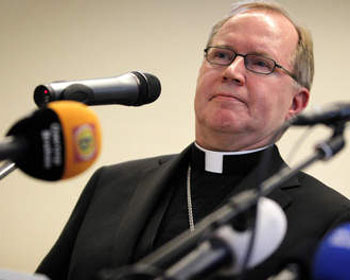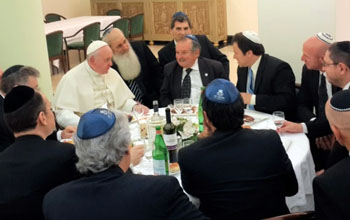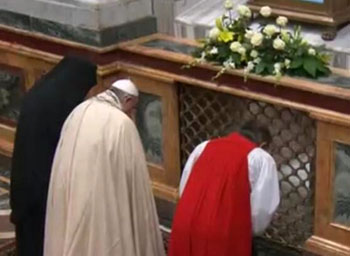Ecumenism
 |
 |
 |
 |
 |
 |
 |
What Card. Eijk Forgot to Say
Last week the progressivist Catholic press was blaring the headline, ‘Dutch cardinal’s defense of Trent casts shadow over Unity week.’ (The Tablet, 22 January 2014)
The complaint was that the Week of Prayer for Christian Unity (read history here) was overshadowed in the Netherlands by a row over a statement by Dutch Cardinal Willem Eijk defending the Council of Trent’s teachings as still fully valid.
Card. Eijk, Archbishop of Utrecht, and head of the Dutch Bishops’ Conference, told the Protestant daily Reformatorisch Dagblad that the Council of Trent’s condemnations of Martin Luther’s teachings, for example on the Eucharist, still forbid Protestants from receiving Communion in the Catholic Church. Trent was “a sign of the self-cleansing power” of the Church because it corrected abuses that had developed in its ranks,” he said.
This upset the Protestants, who in turn upset progressivist Catholics, who want unity at any price, and not polemics on points of the Faith, principally on the Holy Eucharist.
“It is not biblical to say the Catholic Church is always right,” said Gerrit de Fijter, chairman of the Protestant National Synod.
 In an open letter to Card. Eijk, Arjan Plaisier, secretary of the Protestant Sect in the Netherlands, said he didn't understand what [Eijk] is doing: “Isn’t this a denial of an ecumenical history which we have gone through together? Does this not block any further dialogue about fundamental faith topics which we can have, unilaterally or in the context of the Council of Churches?” (In Caelo et in Terra, January 21, 2014)
In an open letter to Card. Eijk, Arjan Plaisier, secretary of the Protestant Sect in the Netherlands, said he didn't understand what [Eijk] is doing: “Isn’t this a denial of an ecumenical history which we have gone through together? Does this not block any further dialogue about fundamental faith topics which we can have, unilaterally or in the context of the Council of Churches?” (In Caelo et in Terra, January 21, 2014)
Of course, Catholic officials were quick to assure the Protestants that Eijk didn’t mean to offend anyone by his remarks. The Tablet reports that “spokeswoman of the Utrecht Archdiocese Anna Kruse expressed shock at the reactions and noted that Eijk had put down the Trent condemnations as “mainly a theoretical issue” and did not intend to offend Protestants. (The Tablet, ibid)
The Tablet and other English media failed to report, however, that Card. Eijk said other things. In fact, he does not seem to be the great champion of Tradition and orthodoxy that it appeared from his first remarks.
After his first comments, he immediately emphasized that people who today have a different image of God or understanding of the faith can’t be blamed for that: upbringing and tradition are not a reason to declare anyone cursed in the sight of God. (In Caelo et in Terra, ibid. )
Thus, Eijk, like other progresssivists, in effect put down the Trent anathemas as irrelevant to our times and certainly not referring to modern Protestants or any other persons who are simply unaware of them.
If the Cardinal wanted to be a conservative champion, he should have spelled out to everyone the teachings of Trent so that today’s Protestants could know them and convert. Also the Dutch clergy and faithful could benefit from reviewing that immutable truth.
This, Card. Willem Eijk lamentably did not do. So, I believe he cannot be credited as being a new hero of traditionalism as some are pretending.
Anathemas of Trent applicable to our days
To not fall into the same error, let me remind my readers which anathemas made by the Council of Trent that the Dutch Cardinal did not mention:
 What follows are the additional “Trent Shadows” that were neither taught nor defended during “Christian Unity Week.”
What follows are the additional “Trent Shadows” that were neither taught nor defended during “Christian Unity Week.”

The complaint was that the Week of Prayer for Christian Unity (read history here) was overshadowed in the Netherlands by a row over a statement by Dutch Cardinal Willem Eijk defending the Council of Trent’s teachings as still fully valid.
Card. Eijk, Archbishop of Utrecht, and head of the Dutch Bishops’ Conference, told the Protestant daily Reformatorisch Dagblad that the Council of Trent’s condemnations of Martin Luther’s teachings, for example on the Eucharist, still forbid Protestants from receiving Communion in the Catholic Church. Trent was “a sign of the self-cleansing power” of the Church because it corrected abuses that had developed in its ranks,” he said.
This upset the Protestants, who in turn upset progressivist Catholics, who want unity at any price, and not polemics on points of the Faith, principally on the Holy Eucharist.
“It is not biblical to say the Catholic Church is always right,” said Gerrit de Fijter, chairman of the Protestant National Synod.

Card. Eijk's interview "casts shadows" on Christian Unity Week at the Vatican
Of course, Catholic officials were quick to assure the Protestants that Eijk didn’t mean to offend anyone by his remarks. The Tablet reports that “spokeswoman of the Utrecht Archdiocese Anna Kruse expressed shock at the reactions and noted that Eijk had put down the Trent condemnations as “mainly a theoretical issue” and did not intend to offend Protestants. (The Tablet, ibid)
The Tablet and other English media failed to report, however, that Card. Eijk said other things. In fact, he does not seem to be the great champion of Tradition and orthodoxy that it appeared from his first remarks.
After his first comments, he immediately emphasized that people who today have a different image of God or understanding of the faith can’t be blamed for that: upbringing and tradition are not a reason to declare anyone cursed in the sight of God. (In Caelo et in Terra, ibid. )
Thus, Eijk, like other progresssivists, in effect put down the Trent anathemas as irrelevant to our times and certainly not referring to modern Protestants or any other persons who are simply unaware of them.
If the Cardinal wanted to be a conservative champion, he should have spelled out to everyone the teachings of Trent so that today’s Protestants could know them and convert. Also the Dutch clergy and faithful could benefit from reviewing that immutable truth.
This, Card. Willem Eijk lamentably did not do. So, I believe he cannot be credited as being a new hero of traditionalism as some are pretending.
Anathemas of Trent applicable to our days
To not fall into the same error, let me remind my readers which anathemas made by the Council of Trent that the Dutch Cardinal did not mention:

Francis hosts a kosher lunch for rabbis at Santa Marta House
- "Just as the Church cannot err in Faith and Morals; so, on the contrary, all other societies arrogating to themselves the name of 'church' must necessarily be sunk in the most pernicious of errors, both doctrinal and moral, because they are guided by the Devil." (Catechism of Trent, p. 107)
- " All those who do not have the Faith sin against the First Commandment. Such sinners are very numerous, for they include all who fall into heresy, all who reject what Holy Mother Church proposes for our belief." (Ibid., pp. 361,369)
- "He, who to support heresy, distorts the Sacred Scriptures from their genuine and true meaning is guilty of the greatest injury to the Word of God; and against this Crime we are warned by the Prince of the Apostles: 'There are certain things hard to understand [in the epistles of St. Paul] that the unlearned and unstable adulterate, as they also do with other Scriptures, to their own destruction' (2 Peter 3:16)." (Council of Trent, "Decree on Edition and Use of the Sacred Books," session IV, D. 786)
- "Just as no man can enter any place without him who has the keys, so no one is admitted to Heaven unless its gates be unlocked by the priests to whose custody the Lord gave the keys." (Catechism of Trent, p. 286)
- "The Church alone possesses the beneficial use of the Sacraments, the efficacious instruments of grace." (Ibid., p. 105)
- "This Sacrament of Penance is necessary for salvation for those who have fallen (into mortal sin) after Baptism, just as Baptism itself is necessary for salvation for those who have not yet regenerated: 'Unless you do penance, you shall all likewise perish.'(Luke 13:5)." (Council of Trent, "On Penance," chapter 2; D. 895)
- "If anyone says that the man who falls (into mortal sin) after Baptism can recover justice by 'faith alone' without the Sacrament of Penance, let him be anathema. (Ibid., "On Penance," session VI, canon 29, D. 839)
- If anyone says that, to obtain remission of sins in the Sacrament, it is not necessary according to Divine Law to confess each and every Mortal Sin that is remembered, let him be anathema." (Ibid., session XIV, chapter 4, D. 898; canon 7, D. 917)
- "Sins can be forgiven only through the Sacraments when duly administered; hence, it follows that both priests and Sacraments are the instruments that Christ makes use of to accomplish in us the pardon of sin and the grace of justification: 'Whose sins you forgive are forgiven them, whose sins you retain are retained.' (John 20:23)." (Catechism of Trent, p. 115)
- "If anyone says that the Commandments of God are impossible to observe, even for a man who is justified and in the state of grace; let him be anathema." (Council of Trent, "On the Sacraments," canon 4, D. 847)
- "All true justification either begins through the Sacraments or, once begun, increases through them, or, when lost, is regained through them." (Ibid., "Prologue," session VII, D. 843a)
- "No one, however much justified, should consider himself exempt from the observance of the Commandments; no one should use that rash statement, forbidden under anathema, that the observance of the Commandments of God is impossible for one who is justified. For God does not command impossibilities; on the contrary, He admonishes you to do what you can, and to pray for what you cannot do, and He helps you so that you may be able." (Ibid., "On Justification," D. 804)
- "Unbelief is a Mortal Sin." (Ibid. "On Justification," chapter 15; cf. D. 808, 837.

Francis prays with Schismatic and Protestant leaders at St. Paul Outside the Walls for the Unity Week

Posted January 31, 2014
______________________
______________________



